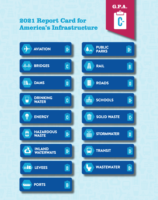ASCE Report: Infrastructure Gap $1.4 Trillion Over 10 Years
Surface-transportation's shortfall accounts for $1.1 trillion of the total
Infrastructure needs in the U.S. will exceed projected spending by $1.4 trillion over the next 10 years and surface transportation programs account for $1.1 trillion of the shortfall, a new American Society of Civil Engineers report says.
The ASCE “Failure to Act” study, released on May 10, also says that if current funding levels continue, the gap will widen to $5.1 trillion by 2040.
Greg DiLoreto, ASCE past president, said in a briefing for reporters, ”Our nation’s infrastructure bill is overdue.” He added, Poor infrastructure is inefficient and it puts a drag on America’s economy.”
Steve Landau, vice president with Boston-based Economic Development Research Group Inc.—which did the report—said that the $1.4-trillion, 10-year estimated gap has “stabilized” since ASCE’s last Failure to Act study, released in 2012.
The new report’s annual average shortfall is $140 billion over 10 years; the 2012 report’s estimate was $157 billion a year over seven years.
Looking at other types of infrastructure besides surface transportation, the report pegs the 10-year gap for electricity sector at $212 billion. Water and wastewater’s shortfall is $113 billion. Aviation needs exceed spending by $46 billion, and the gap for ports and inland waterways is $18 billion.
DiLoreto, retired CEO of the Tualatin Valley Water District in Washington County, Ore., says that recent legislation “has not done enough to break away from the status quo,” For example, he says funding increases in the Fixing America’s Surface Transportation Act, signed into law last December, are “minimal—really only accounting for inflation.”
Though the study doesn’t recommend specific plans for increasing infrastructure funding, DiLoreto says, “We certainly are open to all means to raise the funds that we need to close that gap.” For example, he says that, in surface transportation, ASCE has supported increasing the gas tax and exploring fees on vehicle miles traveled.
In electricity and water sectors, DiLoreto says, “The gap gets closed really in one way, and that’s by user fees.” He says, “To close that gap is going to require two things. One, it’s going to require continued efficiencies in the expenditures that those utilities make, and then, secondly, it’s going to require an increase in the rates...." Di Loreto also chairs ASCE's committee for America's infrastructure.
U.S. Transportation Secretary Anthony Foxx also says more infrastructure funding is needed. Asked at a May 10 briefing for reporters about a pending Senate transportation appropriations bill—whose funding is less than DOT had proposed—Foxx said he was pleased that the measure was moving forward. But he addedadded, “We still have a chronic problem in this country of underinvesting, and that’s still part of our challenge.”



